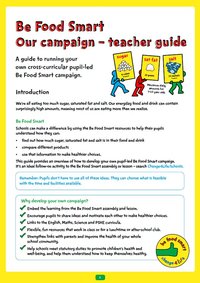Be Food Smart: pupil campaign pack
Find out how to develop your own pupil-led Be Food Smart campaign. This is great follow-on activity to the Be Food Smart: assembly presentation, KS1 lesson plan and KS2 lesson plan.
"The Food Smart advertising Campaign is very appealing. It's pupil-led, which celebrates what they know or have learned. It means children collaborating and being active learners."
Sandra Small, KS1/2 teacher
Try this
Harness the 'pupil voice' by recruiting some pupil champions to take the lead with your campaign. Older pupils could work with younger pupils in peer-led learning sessions.
Curriculum
Supports the English, mathematics, science and PSHE curricula
KS1 English:
- Ask relevant questions to extend their understanding and knowledge
- Articulate and justify answers, arguments and opinions
- Participate in discussions, taking turns and listening to what others say
- Give well-structured descriptions, explanations and narratives for different purposes, including for expressing feelings
- Select and use appropriate registers for effective communication
KS2 English:
- Listen to and discuss a wide range of fiction, non-fiction and reference materials
- Retrieve, record and present information from non-fiction
- Participate in discussion, take turns and listen to what others say
- Explain and discuss their understanding of what they have read or listened to
- Give well-structured descriptions, explanations and narratives for different purposes
- Plan, draft and write through discussion and recording of their ideas, and select the appropriate form for their writing
- Evaluate, edit and proofread their written work
KS1 Mathematics:
- Count, read and write numbers
- Identify and represent numbers using objects and pictorial representations
- Compare, describe and solve problems
- Mental fluency with whole numbers, counting and place value
- Solve problems with addition and subtraction mentally and using concrete objects and pictorial representations
KS2 Mathematics:
- Identify, represent and estimate numbers using different representations
- Solve number problems and practical problems involving multiplication, addition, subtraction and division
- Develop mathematical reasoning
- Recognise and use fractions
KS1 Science
- Identify and classify
- Use data to help answer questions
- Animals, including humans: describe the importance for humans of eating the right amounts of different types of food
KS2 Science
- Make systematic and careful observations and take accurate measurements
- Gather, record, classify and present data in a variety of ways to help answer questions
- Record findings using simple scientific language, drawings, labelled diagrams, keys, bar charts and tables
- Report on findings from enquiries, including oral and written explanations, displays or presentations of results and conclusions
- Identify that animals, including humans, need the right types and amount of nutrition
PSHE
- Core Theme 1: Health and Wellbeing – healthy eating
In the classroom
The Be Food Smart pupil campaign pack encourages pupils to share ideas and motivate each other to make healthier choices.
The resources are flexible, fun and help embed the learning from the other Be Food Smart resources. They work in class, or for a lunchtime or after-school club.
The pack includes:
- Our Campaign – teacher guide: ideas for how to approach your campaign, whether it's big or small
- Our Campaign – pupil guide: helps older pupils run their own campaign more independently
Developing your own school campaign can strengthen links with parents and improve the health of your whole school community.
It also helps schools meet statutory duties to promote children's health and wellbeing and help them understand how to keep themselves healthy.
Learning objectives
After running the campaigns, pupils will be able to
- know how to carry out research to gather data
- understand how to communicate key messages effectively
- understand how to find out what's in their food – using labels or the NHS Food Scanner app
- explain how to use that information to make healthier choices
Resource details
- Published: 22 August 2024
- Last updated: 8 August 2024
